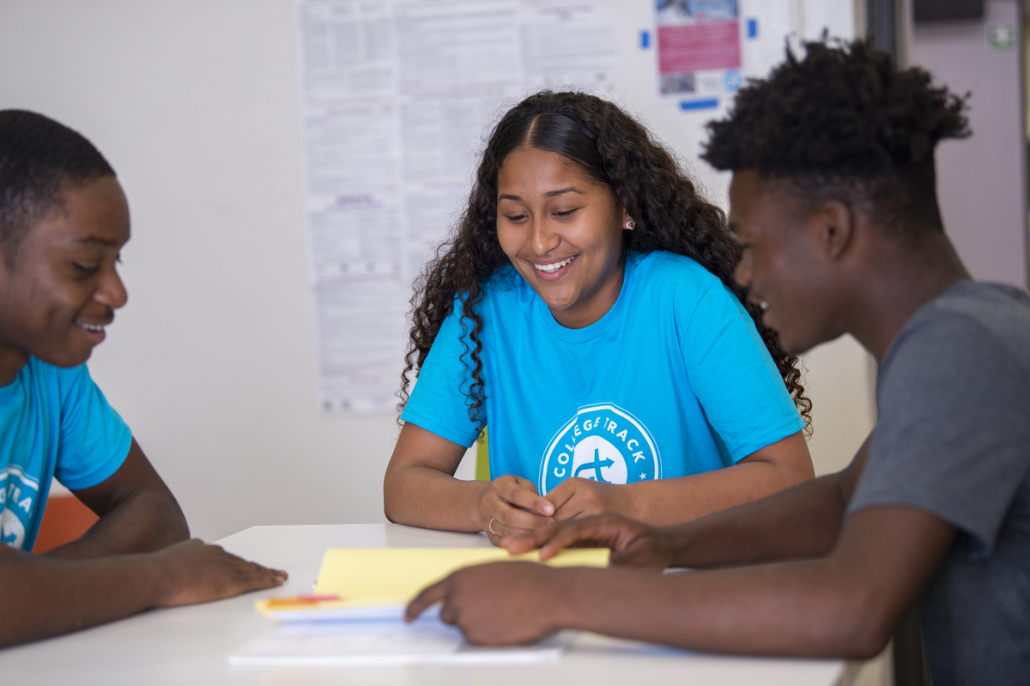College Track makes education a reality

As a first-generation student from a low-income background, Vivian Wu did not know about the steps she’d have to take to apply and go to college. Enrolling in College Track, a program designed to assist students from low-income communities in achieving their post-secondary goals, gave Wu a guarantee for success in college.
College Track started in 1997 as an effort to help underrepresented and first-generation students from low-income backgrounds continue their education and pursue their bachelor’s degrees. Today, the program operates nationwide at various on-site locations and has partnered with various organizations and institutions, including USC.
Through the program, Wu, a junior majoring in communication. attended financial aid workshops and received help writing her personal statements. When she decided to attend USC, Wu said she was paired with a college completion coach that guided her through internship and job opportunities.
College Track operates across the Los Angeles region in Boyle Heights and Watts, and its newest site in Crenshaw, which opened to its first cohort of students last February, is located a few miles away from the University Park Campus.
According to Senior Vice President for University Relations Samuel Garrison, the University’s partnership with College Track Crenshaw is just one of the many ways the University servies families. With the University providing hundreds of community programs to thousands of local families, he said the partnerships with programs and organizations intend to maximize positive impact and create opportunity in communities.
“Partnerships like College Track are part of President [Carol] Folt’s comprehensive commitment to expand college access and opportunity across Los Angeles, especially on the Eastside and South L.A.,” Garrison said. “Collaboration is essential, which is why we’re partnering and supporting organizations like College Track. We learn from each other, and we collaborate to build a shared vision in service to the communities we serve.”
Wu said it’s “great to hear” the University is collaborating with College Track, as both institutions have sets of “valuable” networks and resources that students enrolled in the program will benefit from.
“Being able to have that partnership happen is great in hopefully getting those resources to people who need it and who desperately want it as well,” Wu said. “USC is known as such a prestigious and privileged place, so it’s great to see that they’re taking a step toward sharing some of those privileges and sharing some of those resources.”
Among those part of the College Track’s Los Angeles Advisory Board for the Crenshaw location is former alumna and Olympic gold medalist Allyson Felix, who joined the board last July. Felix, who graduated from USC in 2008, grew up in the Crenshaw District.
“College Track having a center in the Crenshaw District is so huge because there’s so many students there that can benefit and have such bright futures,” said Felix in an interview with College Track. “I know the impact that it’s going to have on their lives, and it’s really going to not only affect the students but really change families and [the] community as a whole.”
Across the College Track sites, including those located in the L.A. area, the program sticks to a plan that serves students for 10 years, beginning in the ninth grade and ending in the student’s final year of college. By doing so, College Track aims to eliminate “academic, financial and social-emotional barriers” that prevent students from attaining a college education.
According to Crenshaw Site Director Wintor McNeel, students who visit the locations and commit to the program receive guidance and preparation from its academic affairs department, student life department and wellness department. Each department carries a different purpose, such as one-on-one tutoring.
McNeel also said College Track aids parents by explaining the college process through informational nights that talk about topics such as the college admission process and financial aid.
“Be that many of our students are first generation, we want to ensure that they are able to overcome any systemic barriers that their family members face that prevented them from getting into college and ensuring that our students are prepared and the families, as well,” she said.

Across all of its sites, College Track has 15 active students who currently attend USC in the program, three of whom are from the Los Angeles region. Apart from those enrolled, four more students are alumni of the program and have already received their bachelor’s degrees.
One of those active 15 students is Jordan Sosa, a freshman majoring in electrical and computer engineering, who is part of College Track San Francisco. He enrolled in College Track during his freshman year of high school and joined after hearing about the ACT preparation and essay writing help it offered. He also said the guides of the program kept track of his academic progress.
“The most helpful part of it was definitely the mentors and the staff,” he said. “They keep tabs on you a lot. They make sure you’re on top of your things and make sure you’re on track to graduate high school and get into college.”
Like Wu, Sosa recognized the partnership between College Track and the University as a “great thing,” considering how families may not be able to afford college tuition costs.
“There’s a lot of bright students out there and underserved communities that without the right guides, they wouldn’t be able to make it to these prestigious schools without the guides,” Sosa said. “I think that the partnership really helped that a lot because they will motivate them to apply here.”
L.A. Regional Executive Director of College Track John Lee said the partnership between the University and College Track will allow students the chance to connect to more offerings from the University, such as the USC Bovard Scholars Program, which helps high-achieving students with financial barriers find admission at top colleges across the nation and even help them matriculate.
“I’m confident that our partnership is going to help expand the pipeline of College Track students who apply to USC and for the University community to be strengthened by the presence and the experiences of our students,” Lee said. “The partnership enables us to offer College Track services to more students in our region, regardless of where they enroll in college, and for that, we’re extremely grateful.”
Lee said he hopes others will have the opportunity to hear about the program and potentially join.
“We joke within our College Track team that College Track is one of the best kept secrets,” he said. “We don’t want to be a secret anymore … What I expect to see is that we’re gonna see more and more students each year.”
Since the Crenshaw location is new, it currently only serves high school freshmen and sophomores. However, Lee said he expects those students will eventually graduate from high school and go off to college and that the Crenshaw site will see an increase in enrollment over time. At full capacity, Lee said that the Crenshaw location would serve at least 240 students spanning from the ninth to 12th grade.
McNeel said serving in College Track gives her the opportunity to see herself in the students. Being a part of the program, McNeel said, aligns with her educational philosophy of meeting students and being able to support them.
“It speaks to my soul in so many ways because I was the students, and I am the students that we serve growing up in the Crenshaw district community — a first-generation college student,” McNeel said. “Being able to return to my community has always been a dream of mine; to serve the community and help students know that college is not an option, but it is an opportunity that they have access to is invaluable.”
A previous version of this article misstated that Senior Vice President for University Relations Samuel Garrison said“we collaborate to build a shared vision in service to the communities workbook” instead of “communities we serve.” The Daily Trojan regrets this error.

